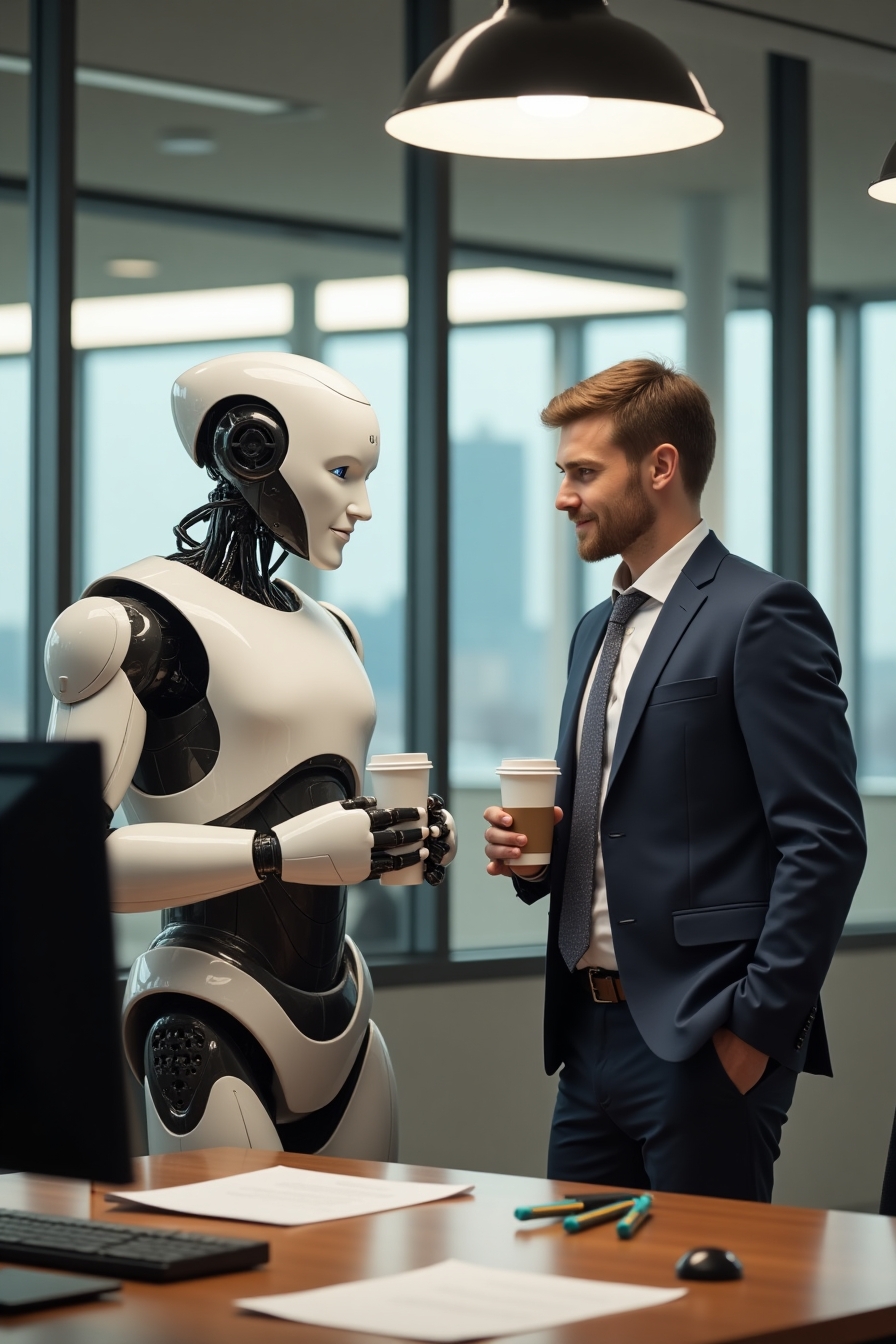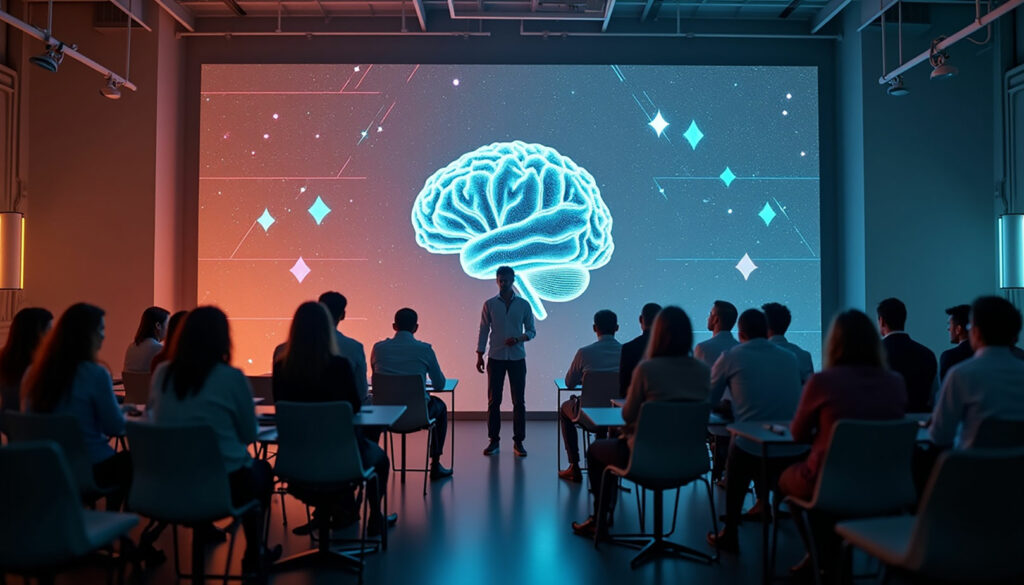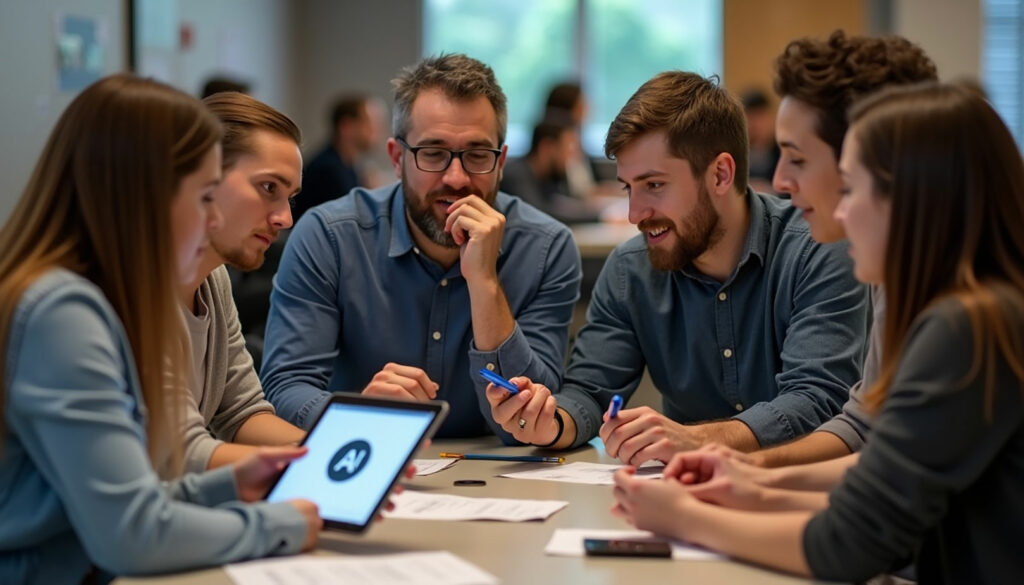Can AI become a team member?

How successfully are companies already using AI?
In November 2024, the Federal Statistical Office published the following press release: “In 2024, large companies with 250 or more employees will use AI technologies much more frequently than medium-sized and small companies. Every second large company (48%) uses AI, but only one in four (28%) medium-sized companies with 50 to 249 employees and one in six (17%) small companies with 10 to 49 employees. In all size categories, AI is being used more frequently in companies compared to the previous year.
AI is becoming more and more established in companies, but also in other areas. From students having their bachelor’s thesis written artificially to fake videos on X, formerly Twitter – everyone has heard about the development of artificial intelligence around the world in the news at the latest. AI has already arrived in many everyday lives – and well before the results that are ultimately played out to us. This raises the question: how should companies prepare for the fact that this tool is already part of young people’s daily lives?
How companies integrate AI into their work
The use of artificial intelligence in companies is no longer limited to programmes such as Chat GPT, which are used in a similar way to search engines. The Federal Statistical Office writes: “Companies that use AI most frequently use technologies for analysing written language or text mining (48%), technologies for speech recognition (47%) and technologies for generating natural language (34%). These technologies are primarily used for marketing or sales (33%), for production or service processes (25%), for the organisation of company administration processes or management (24%) and for accounting, controlling or financial management (24%).”
Areas of responsibility that are covered by AI in companies are therefore increasingly overlapping with those that were previously carried out purely by humans. AI can now take over essential tasks that were previously carried out by a colleague, acting as a constant in everyday working life.

Can artificial intelligence also become a team member in the company?
In order to find an answer to this question, it is first necessary to look at a team in general. How do you become a team member, i.e. what actually makes a team member?
AXA statistics from 2022 show the results of a survey of small and medium-sized companies in German- and French-speaking Switzerland on the question: “What qualities and skills do you consider particularly important in your employees?”
It is clear that skills such as independence, flexibility and the ability to work in a team are the most important for respondents when it comes to their employees. Can an AI system replicate this in a company?
In Austria, a similar survey was conducted by MAKAM Research in 2018, which asked respondents the question: “Which of the following characteristics do you particularly value in your employees?”.
Here too, it is clear that the ability to work in a team, honesty and loyalty are the qualities that are particularly valued in employees.
It can therefore be stated that for the majority, it is probably personal qualities that are important to them when working with their team colleagues. The term teamwork skills stands out in particular, as it ranks among the top in both Austria and Switzerland.
If these characteristics lead to the ability to work in a team and this ability to work in a team is what makes a good team member for humans, could an AI that fulfils these characteristics not also be a team member?
Can a company trust AI?
It is obvious that AI is reliable and cooperative; after all, these systems were developed to reliably fulfil orders. However, the issue of trust in AI by companies and their teams is the subject of much debate.
To what extent can you trust an artificial programme that has access to billions of pieces of data and is constantly learning?
A statistic from Initiative D21 from 2023 shows that trust in AI applications in Germany grows with the generations. While only 16% of respondents from the baby boomer generation stated that they had complete or mostly complete trust in AI, the figure for Generation Z is 42%, almost three times as high. What remains unclear, however, is what people have confidence in. Is it that the AI will complete the task set or that it will not pass on confidential information, for example? However, such questions could just as easily be asked of a human team member. So perhaps AI in companies would not be a worse team member?
Do we automatically place more trust in humans even though they do not have a predictable algorithm that is calculable down to the smallest detail? The question of what ultimately distinguishes artificial intelligence from a human being is unavoidable when dealing with this topic, even if companies want to integrate AI even more deeply.

Can artificial intelligence replace innovation and humanity in a company?
An AI in the company will not develop new, innovative ideas. Nor will it show any creativity or provide spontaneous solutions. But probably the most essential thing is that it won’t come into my office in the morning and ask: “How are you today, how was your weekend?”. Artificial intelligence can carry out work tasks, it has specialist knowledge and is constantly learning. It can work independently to a certain extent, is reliable and is results-orientated. These are all qualities that make a good team member. What is missing, however, are interpersonal qualities.
Whether you see an artificial intelligence in your company as just a calculating machine, as an aid in your day-to-day work or as a fully-fledged team member who contributes to getting the job done depends on you. Does it trigger the same feeling when an AI in the company asks me how my day is going as when a colleague does?
Does it only matter to me that a team member does their job conscientiously or do I also want to build a personal, collegial relationship with them? Does only performance count for this work or also personality?
How companies can integrate AI
If you want to fully utilise the benefits of artificial intelligence, it is important to undergo further training, to pay attention to how AI can be used sensibly in the company and to know its strengths as well as its weaknesses and how to deal with them. Making an AI a team member in the company does not mean humanising it and treating it as such. It means understanding its added value for the work and recognising that it performs tasks like everyone else and is a reliable constant in everyday working life, even if it cannot establish a personal relationship with its team colleagues.
To achieve this, companies can book Workshops on the topic of AI or events, as the AI Connect. They are designed to introduce people to artificial intelligence and to work out together how AI can be used sensibly in the company and what added value its work brings.
Each company must decide for itself how far artificial intelligence will find its way into a company and how it will be handled. However, it is clear that AI will not disappear in the future; on the contrary, it will become more relevant. So it’s worth looking into it and asking yourself the question: “Is it time for a different kind of team member?”
|Pia Neugebauer
About the author
Pia Neugebauer is Managing Director and Head of HR at BITOU GmbH and has many years of experience in HR management and leadership styles.
With a flair for interpersonal dynamics and a great deal of enthusiasm for sustainable change processes, she regularly writes about topics that really help teams move forward.
You can find out more about Pia and current projects here.





